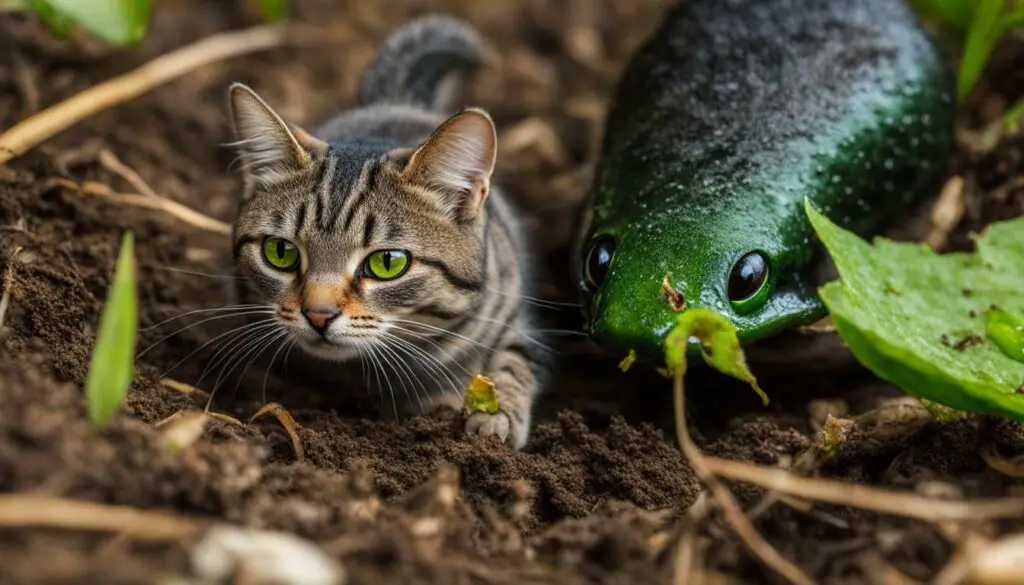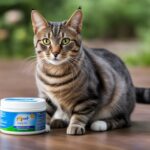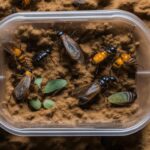As a cat owner, I’ve often wondered about the potential dangers that slugs can pose to my feline companion. Are slugs toxic to cats? What are the facts about slugs and cats? Let’s explore the truth behind these questions and understand the risks involved.
Takeaways>
- Slugs are not poisonous to cats, but they can carry parasites that can cause health issues.
- Lungworm infections, which can be contracted by eating slugs or snails, can be especially dangerous for cats.
- Cats can eat slugs, but it’s not a recommended practice due to the potential for parasite transmission.
- While slugs are not poisonous to cats, the main concern is the risk of contracting a lungworm infection.
- If your cat eats a slug, monitor their behavior and seek veterinary care if any symptoms of illness arise.
By understanding the risks and taking necessary precautions, we can keep our beloved cats safe from the potential dangers of slugs.
Can Cats Eat Slugs?
Cats have a natural instinct to hunt, and slugs can be an easy target for them. However, it is not recommended to let cats eat slugs due to the potential risks involved. Slugs can carry parasites, such as lungworm, that can be harmful to cats if ingested. While not all slugs are infected with parasites, it’s important to take precautions to keep your cat safe from potential health issues.
Lungworm infections can cause respiratory problems, coughing, weight loss, and lethargy in cats. If you suspect that your cat has eaten a slug or may be showing signs of a lungworm infection, it’s best to consult with a veterinarian for proper diagnosis and treatment.
To prevent your cat from eating slugs, it’s important to provide them with a well-balanced diet that meets their nutritional needs. Keeping your cat well-fed can help reduce their hunting instincts and minimize their desire to prey on slugs. Additionally, closely supervise your cat when they are outdoors and limit their access to areas where slugs are likely to be present.
| Risks of Cats Eating Slugs: | Preventive Measures: |
|---|---|
| Cats can contract lungworm infections from infected slugs. | Monitor your cat’s behavior and watch for signs of illness. |
| Slug mucus can contain toxins or harmful substances. | Keep your cat well-fed to reduce their hunting instincts. |
| Cats may experience respiratory problems, weight loss, and lethargy. | Supervise your cat when they are outdoors and limit their access to slug-infested areas. |
| Preventative measures are important to protect your cat from potential health risks. | Consult with a veterinarian if you suspect your cat has ingested a slug or is showing signs of illness. |
In conclusion, while cats can eat slugs, it’s not a recommended practice due to the potential risks involved. It’s important to take preventive measures to keep your cat safe from the harmful effects of parasite-infected slugs. By providing a balanced diet, supervising your cat outdoors, and seeking veterinary care when needed, you can ensure the well-being of your feline friend.
Are Slugs Poisonous to Cats?
Slugs are not poisonous to cats in the sense that they produce toxins that can harm cats. However, it’s important to be aware of the potential harm they can cause. Slugs can carry parasites like lungworm, which can be dangerous for cats if ingested. While slugs themselves are not toxic, it’s the parasites they may host that pose a risk to feline health.
The main concern when it comes to slugs and cats is the potential transmission of lungworm. If a cat eats an infected slug or snail, they can contract a lungworm infection, which can lead to respiratory issues and other health problems. Therefore, it’s essential to take precautions to prevent your cat from eating slugs and minimize their exposure to these potential parasites.
While slugs may seem like a natural part of a cat’s hunting behavior, it’s best to discourage them from eating slugs to avoid any harmful effects. By keeping your cat well-fed, providing distractions, and creating a safe outdoor environment, you can help reduce the likelihood of them hunting and consuming slugs. Regular veterinary check-ups and vaccinations are also crucial for maintaining your cat’s overall health and protecting them from potential risks.
| Harmful Effects of Slugs on Cats |
|---|
| Transmission of parasites like lungworm |
| Potential respiratory issues and health problems |
| Risk of ingesting harmful substances carried by slugs |
| Importance of preventive measures and regular veterinary care |
Symptoms of Lungworm in Cats
Lungworm infection in cats can lead to various symptoms and health issues. It’s important for cat owners to be aware of the signs that may indicate a lungworm infection and to seek veterinary care if any of these symptoms are observed.
Common symptoms of lungworm in cats include:
- Respiratory problems such as wheezing and heavy breathing
- Coughing
- Blood in the urine or stool
- Nose bleeds
- Weight loss
- Lethargy
If your cat exhibits any of these symptoms, it’s important to consult a veterinarian for a proper diagnosis. Lungworm infections can be serious and may require medical treatment to prevent further complications.
“Cats with lungworm may show respiratory symptoms similar to those of other respiratory infections, such as coughing and wheezing. However, blood in the urine or stool, nosebleeds, and weight loss may be specific to a lungworm infection. It’s important to monitor your cat’s health and seek veterinary attention if you suspect a lungworm infection.”
– Dr. Emily Johnson, Veterinarian
| Symptoms of Lungworm in Cats | Description |
|---|---|
| Respiratory problems | Wheezing, heavy breathing, coughing |
| Blood in urine or stool | Sign of internal bleeding |
| Nose bleeds | May occur due to damage to blood vessels |
| Weight loss | Loss of appetite and compromised nutrient absorption |
| Lethargy | General weakness and lack of energy |
If you suspect your cat may have a lungworm infection, it’s important to seek prompt veterinary care. Early diagnosis and treatment can improve the chances of a successful recovery and prevent further health complications.
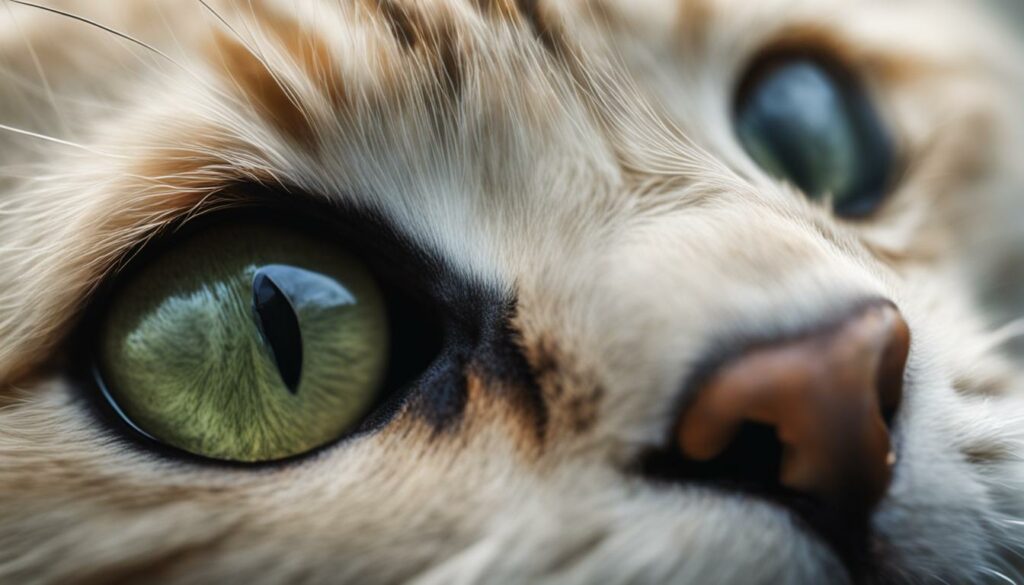
Other Parasites that can Affect Cats
While slugs and snails can be a concern for cats due to the transmission of parasites, such as lungworm, it’s important to be aware that there are other parasites that can affect cats as well. These parasites can potentially cause health issues and discomfort for our feline friends. Let’s take a look at some of the common parasites that can affect cats:
Fleas
Fleas are one of the most common parasites that affect cats. These small, wingless insects feed on the blood of animals and can cause itching, skin irritation, and allergic reactions in cats. Fleas can also transmit other parasites, such as tapeworms, when ingested by cats during grooming. It’s crucial to regularly check your cat for fleas and use appropriate flea prevention and treatment methods to keep them protected.
Ticks
Ticks are another common parasite that can affect cats, especially those that spend time outdoors. These arachnids attach themselves to the skin of animals and feed on their blood. Ticks can transmit diseases such as Lyme disease and ehrlichiosis, which can cause serious health problems in cats. Regular tick checks and the use of tick preventatives can help protect your cat from these parasites.
Ear Mites
Ear mites are tiny parasites that commonly infest the ears of cats. These mites feed on the ear wax and debris in the ear canal, causing irritation and discomfort for cats. Symptoms of ear mite infestation include itching, head shaking, and ear discharge. If you suspect your cat has ear mites, it’s important to seek veterinary care for proper diagnosis and treatment.
| Parasite | Common Symptoms | Treatment |
|---|---|---|
| Fleas | Itching, skin irritation, allergic reactions | Topical flea treatments, oral medications |
| Ticks | Tick attachment, skin irritation, disease transmission | Topical tick preventatives, tick removal |
| Ear Mites | Ear itching, head shaking, ear discharge | Ear mite medications, ear cleaning |
It’s important to regularly monitor and groom your cat, especially if they spend time outdoors or interact with other animals. Prevention, early detection, and appropriate treatment are key to keeping your cat protected from these parasites and maintaining their overall health and well-being.
Can Cats Eat Cooked Snails?
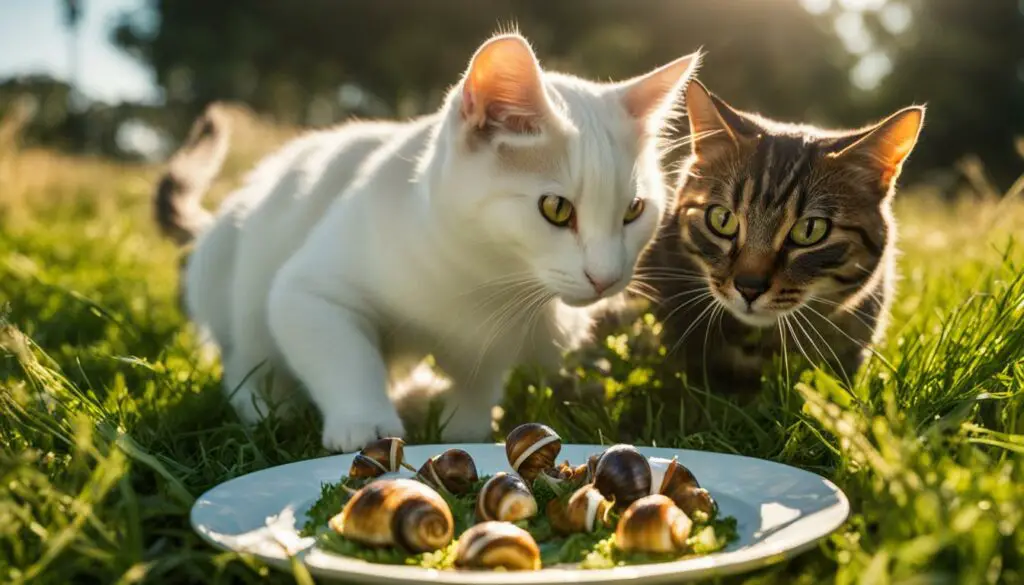
When it comes to feeding cats, it’s important to be mindful of their dietary needs and any potential risks associated with certain foods. While cats are known for their curiosity and willingness to try different things, it’s best to avoid feeding them cooked snails. Although cooked snails may be a delicacy in some cultures, they can pose dangers to our feline friends.
One of the main concerns with cats eating cooked snails is the presence of garlic. Garlic, commonly used as a flavor enhancer in cooked snail dishes, contains compounds that can be toxic to cats. Consumption of garlic can lead to anemia and chronic kidney disease in cats. Therefore, it’s crucial to keep cooked snails away from your cat’s reach and opt for safer protein sources like chicken or fish.
To ensure the safety of your cat, it’s important to choose foods that are specifically formulated for feline nutrition. These foods provide the necessary balance of nutrients and are free from potentially harmful ingredients. If you have any doubts or concerns about what foods are safe for your cat, consult with your veterinarian for professional advice.
Are Slug Baits Poisonous to Cats?
When it comes to protecting our feline friends from potential dangers, we often consider the risks associated with their environment. One common concern is the use of slug baits in our gardens and its impact on our cats’ health. Slug baits can indeed be toxic to cats, posing a significant risk if ingested.
Some slug baits contain a highly toxic chemical called metaldehyde, which can be lethal to cats and other animals. Cats may be attracted to the smell of slug baits and could unknowingly ingest them directly or by consuming a snail that has been exposed to the bait. Even the residue of slug mucus can contain enough metaldehyde to cause harm to cats.
To protect your cat from potential poisoning, it’s crucial to exercise caution when using slug baits. Opt for pet-safe alternatives that do not contain harmful chemicals like metaldehyde. By choosing slug baits that are safe for pets, you can minimize the risk of accidental ingestion and keep your cat out of harm’s way.
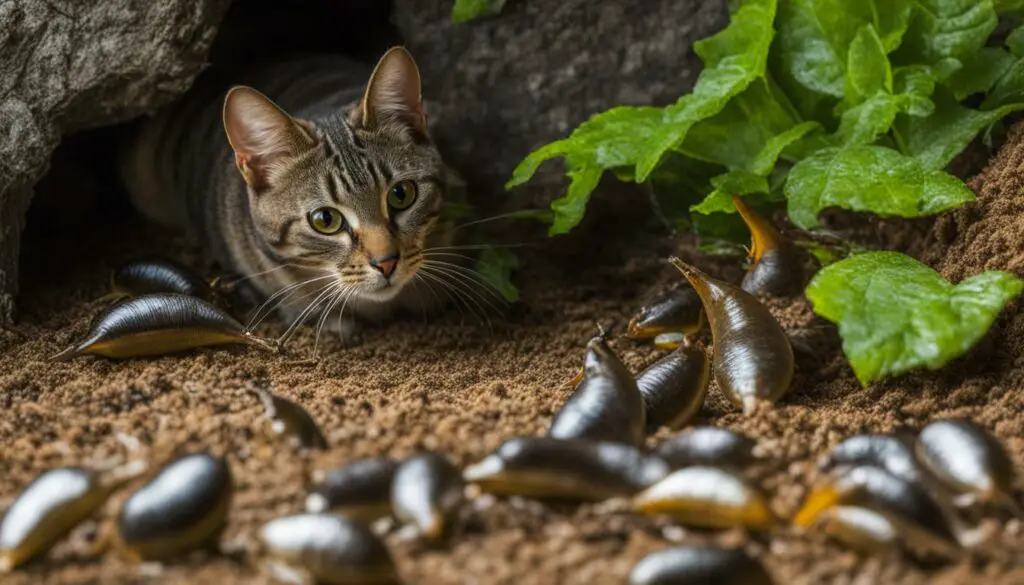
Risks of Cats Ingesting Slug Baits
Ingesting slug baits can have severe toxic effects on cats. Some of the symptoms of metaldehyde poisoning in cats include restlessness, muscle tremors, elevated heart rate, excessive drooling, and convulsions. If you suspect that your cat has ingested slug bait or is showing any of these symptoms, immediate veterinary care is essential.
It is important to remember that prevention is the key to keeping your cat safe. Store slug baits in secure, inaccessible areas and always follow the instructions on the packaging. By being vigilant and choosing cat-friendly alternatives, you can ensure the well-being of your feline companion.
| Toxic Effects of Slug Baits on Cats | Risks of Cats Ingesting Slug Baits |
|---|---|
| Restlessness | Restlessness |
| Muscle tremors | Muscle tremors |
| Elevated heart rate | Elevated heart rate |
| Excessive drooling | Excessive drooling |
| Convulsions | Convulsions |
What to Do If Your Cat Eats a Slug
If your cat eats a slug, it’s important to monitor their behavior and watch for any signs of illness. Not all slugs are contaminated with parasites or pesticides, so it’s possible that no harm will come to your cat. However, if you notice any symptoms of lungworm infection or metaldehyde poisoning, it’s crucial to seek veterinary care immediately. The vet will provide appropriate treatment and steps to ensure your cat’s recovery.
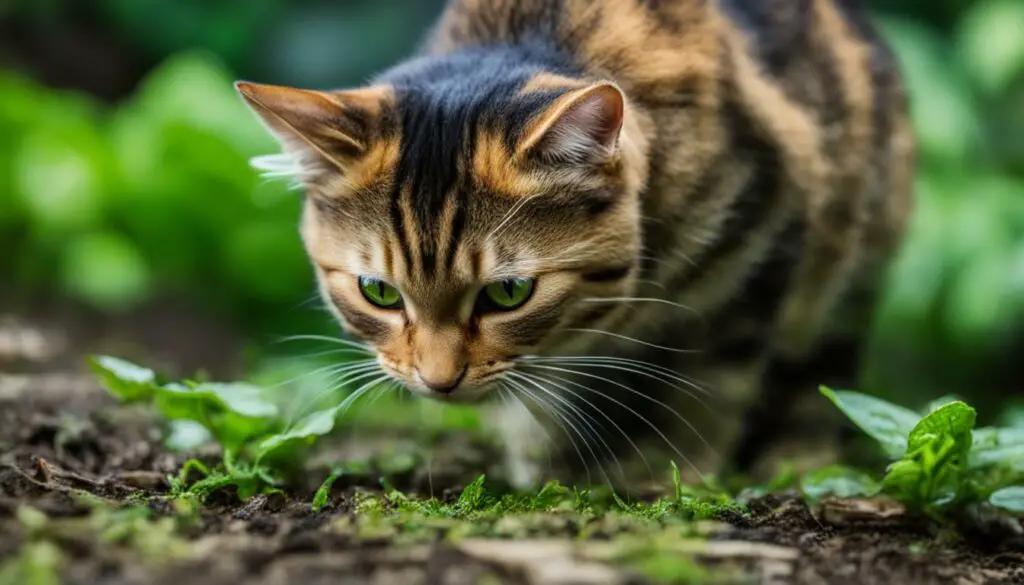
If you’re unsure whether your cat has ingested a slug, be on the lookout for symptoms such as vomiting, diarrhea, lethargy, loss of appetite, or any other unusual behavior. It’s important to remember that prevention is key in keeping your cat safe from potential slug-related illnesses. However, accidents can still happen, so it’s crucial to act promptly if you suspect your cat has consumed a slug.
When you take your cat to the veterinarian, they will conduct a thorough examination and may recommend running tests to determine if any parasites or toxins are present in your cat’s system. Based on the diagnosis, the vet will provide appropriate treatment options, which may include medication to eliminate parasites or supportive care to alleviate symptoms and promote recovery.
Preventing Your Cat from Eating Slugs
To keep your cat safe from slugs and the potential dangers they pose, there are several strategies you can employ:
- Ensure your cat is well-fed: A hungry cat is more likely to hunt and eat slugs. Make sure your cat is eating balanced meals regularly, especially before they go outside.
- Provide distractions: Give your cat a variety of healthy cat treats to keep them occupied and satisfied. By offering new flavors and textures, you can divert their attention away from slugs.
- Supervise outdoor activities: Keep a close eye on your cat when they are outside. Limit their access to areas where slugs are likely to be present, such as gardens or damp areas. This will reduce the chances of them encountering and eating slugs.
- Create a safe environment: Make sure your outdoor environment is safe for your cat. Remove any potential hiding spots for slugs, such as piles of debris or overgrown vegetation. Engage your cat with toys and mental stimulation to reduce their desire to hunt.
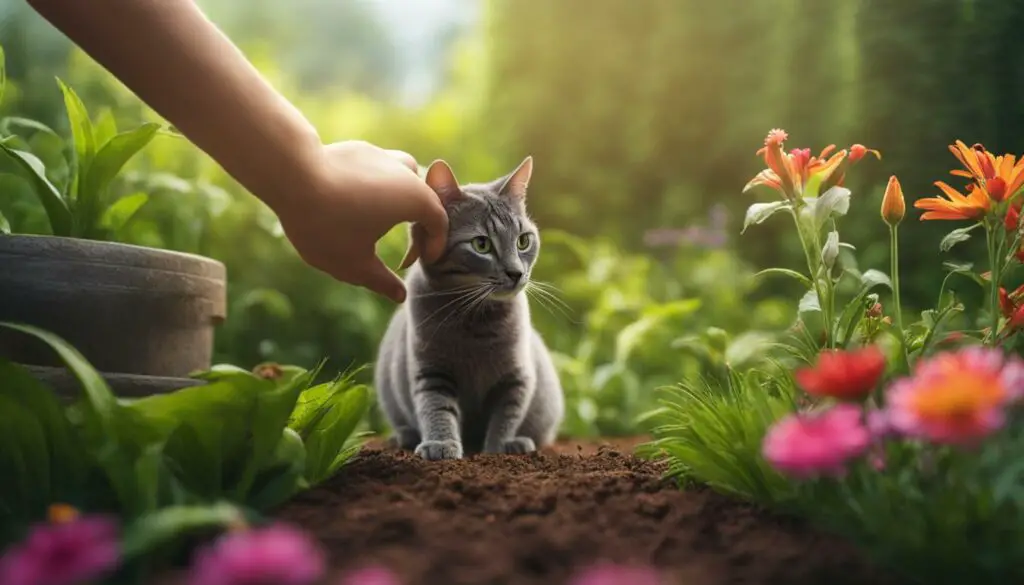
Remember, prevention is key when it comes to keeping your cat safe from slugs. By implementing these strategies, you can minimize the risk of your cat coming into contact with slugs and the potential health hazards they may carry.
Alternative Strategies
If your cat is particularly determined to hunt slugs or you live in an area with a high slug population, there are additional measures you can take:
- Use deterrents: There are commercially available products that can be applied to outdoor areas to deter slugs. These products create an unfavorable environment for slugs and can help keep them away from your cat.
- Consider a cat-friendly garden: If you have a garden, you can create a cat-friendly space that minimizes the presence of slugs. This can involve planting cat-safe plants, such as lavender or rosemary, which naturally repel slugs.
- Train your cat: With proper training, you can teach your cat to avoid hunting slugs. Positive reinforcement techniques, such as rewards for ignoring slugs, can be effective in modifying their behavior.
By implementing these alternative strategies, you can further reduce the likelihood of your cat encountering and consuming slugs, ensuring their safety and well-being.
Safer Ways to Get Rid of Slugs in Your Garden
When it comes to controlling slugs in your garden, there are safer alternatives to using toxic slug poisons. These methods not only protect your plants but also ensure the safety of your beloved feline friend. Here are some effective and natural slug control strategies:
1. Beer Traps
Using beer traps is a popular and pet-friendly method to catch and eliminate slugs. Simply bury a shallow container, such as a plastic cup or jar, in the soil and fill it with beer. The slugs will be attracted to the beer and will drown in the trap. Remember to regularly empty and refill the traps to maintain their effectiveness.
2. Copper Barriers
Copper barriers are another effective way to keep slugs out of your garden without harming your cat. Slugs dislike the reaction between their slime and copper, so placing copper tape or strips around your plants or creating a copper ring around individual pots can act as a deterrent.
3. Diatomaceous Earth
Diatomaceous earth is a natural substance made from the remains of fossilized algae. It works by dehydrating the slugs, causing them to die. Sprinkle diatomaceous earth around the base of your plants or create a barrier around your garden to keep slugs at bay. Be sure to use food-grade diatomaceous earth, as the industrial-grade variety can be harmful to pets.
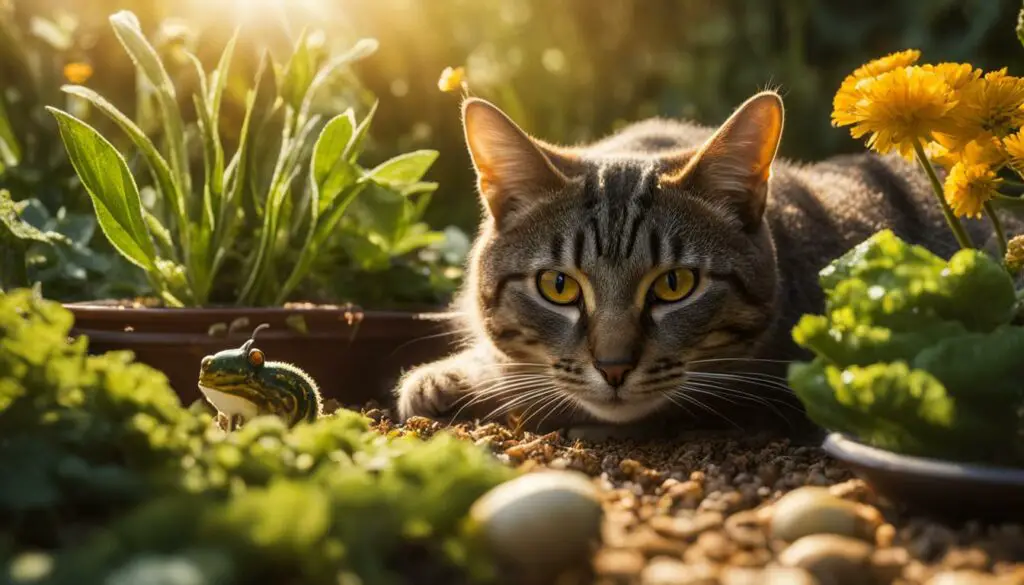
By implementing these safe and effective methods, you can control slugs in your garden without putting your cat’s health at risk. Remember to regularly monitor your garden for any signs of slug activity and take immediate action to prevent damage to your plants. Your cat will thank you for creating a safe and slug-free environment!
The Risks of Slugs for Cats Recap
Now that we have explored the potential dangers of slugs for cats, let’s summarize the key risks to be aware of. While slugs are not toxic to cats in terms of producing harmful toxins, they can carry parasites that can pose health risks. The most concerning parasite is lungworm, which cats can contract by eating infected slugs or snails. Lungworm infections can lead to respiratory issues, coughing, weight loss, and other symptoms.
In addition to lungworm, slugs can also carry other parasites and bacteria that can harm cats. For example, Toxoplasmosis gondii found in diseased rodents can be dangerous for pregnant cats and kittens. Moreover, certain foodborne parasites and bacteria, such as roundworm, tapeworm, E. coli, Salmonella, and Listeria, can be present in slugs and pose threats to cats when ingested.
It’s important to note that slug baits containing metaldehyde are highly toxic to cats and should be avoided. Even the residue of slug mucus can contain enough metaldehyde to cause harm. If your cat happens to ingest a slug or shows any signs of illness, such as respiratory problems or unusual behavior, it is essential to seek veterinary care immediately. A veterinarian can provide the necessary treatment and guidance to ensure your cat’s well-being.
| Summary of Slug-Related Risks for Cats |
|---|
| 1. Slugs can carry lungworm and other parasites that can pose health risks to cats. |
| 2. Lungworm infections can cause respiratory issues, coughing, weight loss, and other symptoms. |
| 3. Slugs can also carry Toxoplasmosis gondii and other foodborne parasites and bacteria that are harmful to cats. |
| 4. Slug baits containing metaldehyde are toxic to cats and should be avoided. |
| 5. If your cat ingests a slug or exhibits any signs of illness, seek veterinary care immediately. |
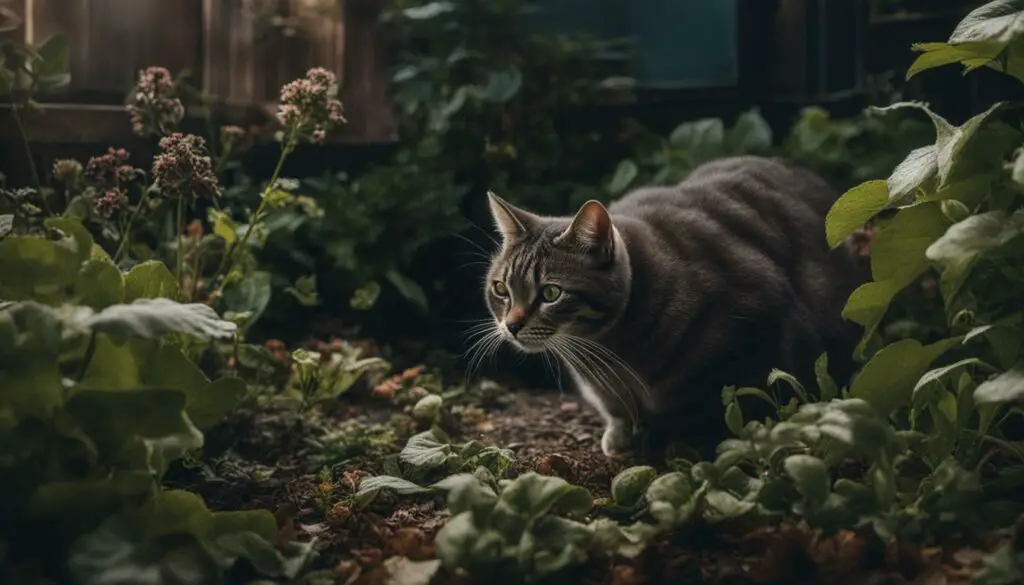
Ways to Protect Your Cat’s Health and Well-being
As responsible pet owners, it is our duty to prioritize the health and well-being of our feline friends. By taking certain measures, we can ensure that our cats are protected from parasites, stay safe outdoors, and maintain optimal overall health.
Preventing Parasites
One of the key ways to protect your cat from parasites is to follow a regular preventative healthcare regimen recommended by your veterinarian. This includes vaccinations and routine deworming treatments. Regular check-ups can help detect any signs of infestation early on, allowing for prompt treatment.
Additionally, it’s important to keep your cat’s living environment clean and free from pests. Regularly clean and disinfect litter boxes, bedding, and toys to minimize the risk of parasite transmission. Avoid allowing your cat to come into contact with rodents, as they can carry parasites such as Toxoplasma gondii.
Creating a Safe Outdoor Environment
While indoor cats are generally at a lower risk of encountering parasites, outdoor cats require extra precautions. Ensure that your cat’s outdoor space is secure and free from potential hazards. This may involve installing cat enclosures or using cat-proof fencing to prevent them from wandering into areas where they may come into contact with slugs, snails, or other harmful organisms.
Supervising your cat’s outdoor activities is crucial. Keep an eye on their behavior and intervene if you notice them attempting to hunt or eat potential sources of parasites, such as slugs or snails. Engaging your cat with interactive toys and playtime can help redirect their hunting instincts toward safer alternatives.
Maintaining Overall Health
A balanced and nutritious diet plays a vital role in maintaining your cat’s overall health and strengthening their immune system. Provide your cat with high-quality cat food that meets their nutritional needs and avoid feeding them raw or undercooked meat, as it may contain harmful bacteria and parasites.
Regular exercise is essential for keeping your cat physically and mentally stimulated. Set aside dedicated playtime each day to ensure they get the exercise and mental enrichment they need. Interactive toys, scratching posts, and climbing structures can also help keep your cat engaged and entertained.
| Protecting Your Cat | Preventing Parasites | Creating a Safe Outdoor Environment | Maintaining Overall Health |
|---|---|---|---|
| Follow a regular preventative healthcare regimen | Keep living environment clean and pest-free | Ensure outdoor space is secure and hazard-free | Provide balanced and nutritious diet |
| Regular check-ups and vaccinations | Minimize contact with rodents | Supervise outdoor activities | Engage in regular exercise and play |
| Early detection and treatment of infestations | Avoid contact with slugs and snails | Redirect hunting instincts with toys | Use interactive toys and scratching posts |
By implementing these measures, we can ensure that our beloved cats lead happy and healthy lives. Protecting them from parasites, ensuring their safety outdoors, and maintaining their overall health are essential aspects of responsible pet ownership.
Conclusion
After discussing the facts about slugs and their potential effects on cats, it is clear that while slugs themselves are not toxic to cats, they can carry parasites that can pose health risks. Lungworm infections, in particular, can be dangerous for our feline friends. It is crucial to be aware of these risks and take necessary precautions to protect our cats.
Cats can eat slugs, but it is not recommended. The parasites and harmful substances that slugs can carry can lead to health issues, so it’s best to prevent our cats from eating slugs altogether. Similarly, while slugs are not poisonous in the traditional sense, the main concern is the potential for cats to contract a lungworm infection from an infected slug or snail.
Aside from slugs, other parasites can also affect cats, such as those transmitted by rodents or found in raw food. It’s essential to be aware of all potential sources of parasites and take appropriate measures to protect our cat’s health. Additionally, cooked snails should be avoided as they often contain ingredients like garlic that can be harmful to cats.
To protect our cats, it is important to monitor their behavior and watch for any signs of illness if they have eaten a slug. Seeking veterinary care is crucial if we notice symptoms of lungworm infection or metaldehyde poisoning. Prevention is key, and we need to take steps to keep our cats from eating slugs, such as keeping them well-fed, providing distractions, and creating a safe outdoor environment. By understanding the risks and taking appropriate measures, we can keep our cats safe from the potential dangers of slugs.
FAQ
Are slugs toxic to cats?
Slugs are not poisonous to cats, but they can carry parasites that can cause health issues.
Can cats eat slugs?
Cats can eat slugs, but it’s not a recommended practice due to the potential risks associated with parasites and harmful substances.
Are slugs poisonous to cats?
Slugs are not poisonous to cats in the sense that they produce toxins, but they can carry parasites like lungworm that can cause health issues.
What are the symptoms of lungworm in cats?
Symptoms of lungworm infection in cats can include respiratory issues, coughing, blood in urine or stool, weight loss, and lethargy.
What other parasites can affect cats?
Cats can be affected by various parasites like Toxoplasmosis gondii, roundworm, tapeworm, E. coli, Salmonella, and Listeria from sources like rodents, raw food, and slugs.
Can cats eat cooked snails?
It is not recommended to feed cats cooked snails due to the potential harm from ingredients like garlic.
Are slug baits poisonous to cats?
Yes, slug baits containing metaldehyde can be toxic to cats and should be avoided to prevent poisoning.
What should I do if my cat eats a slug?
If your cat eats a slug, monitor their behavior and seek veterinary care if any signs of illness or poisoning occur.
How can I prevent my cat from eating slugs?
You can keep your cat well-fed, provide distractions, supervise them outdoors, and create a safe environment to reduce the desire to hunt and eat slugs.
What are safer ways to get rid of slugs in my garden?
Consider using pet-friendly slug poisons, slug traps, or natural options like diatomaceous earth to control slugs without harming cats or other pets.
What are the risks of slugs for cats?
Slugs can pose risks to cats due to the potential transmission of parasites like lungworm and the toxicity of slug baits containing metaldehyde.
How can I protect my cat’s health and well-being?
Schedule regular veterinary check-ups, keep your cat indoors or supervised outdoors, provide a balanced diet, and engage your cat with toys and mental stimulation.
Source Links
- https://upgradeyourcat.com/are-slugs-dangerous-to-cats/
- https://www.hepper.com/can-cats-eat-slugs/
- https://www.untamedcatfood.com/blogs/nutrition/do-cats-eat-slugs

